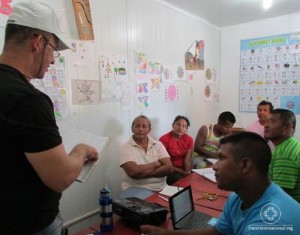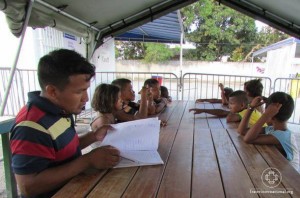Just as in every human society, joy can stimulate a more dynamic and productive way of life.

Joy has been an impulse to motivate Indigenous people of the Warao and Eñapa ethnic groups, sheltered in the urban region of the city of Boa Vista, as well as an indication of better emotional health and greater confidence in a still uncertain future.
In moments of learnings and social interaction, an easy smile and the hope for a more dignified life appear again on their faces.
The reasons for this change in emotional predisposition are the educational programs and entertaining activities developed through the joint initiative of collaborating institutions.
A relation of mutual help
It is 6:00 a.m., the day has begun to dawn. In the shelter of Pintolandia, inserted in the city of Boa Vista. Without the usual exuberant nature of forests and rivers, its inhabitants begin to roam, seeking activities that simulate a normal and possibly healthy daily life.
 Children are the first to wake up and celebrate the new day. There are more than 300 children among approximately 600 indigenous people altogether who were welcomed in the place. Each family groups numerous brothers, sisters and cousins, perhaps some children of friends. They have come together in search of a better life condition.
Children are the first to wake up and celebrate the new day. There are more than 300 children among approximately 600 indigenous people altogether who were welcomed in the place. Each family groups numerous brothers, sisters and cousins, perhaps some children of friends. They have come together in search of a better life condition.
The improvised school under a roof, with desks and chairs, awaits its enthusiastic students, with their respective parents, as enthusiastic as their children and the teachers themselves, chosen from the sheltered community. Everyone feels happy and infect the environment with the joy that their new tasks generate.
The mechanism of joy
In their natural habitat, the original peoples, in interaction with the Kingdoms of Nature, have the privilege of rejoicing with the abundant resources that the forest offers. Spontaneous joy settles in, produced by the natural balance of biochemical agents.
As we know, endorphins and other biochemical mechanisms, as they are produced during certain activities, such as physical exercises or ingestion of certain foods, are made by our organism in a natural way, enhancing the sensation of well-being and, as a result, of happiness and joy.
Change of habits

“When the study groups with children and adults were created, it seems that life within was transformed”, reports a volunteer. “Most of them had hardly any contact with timetables, with clocks, as their times were marked by the events of nature. Then, when the hours for classes were appointed, their lives became different. You could tell on the face of the children the joy they had as they got ready when it was time for class; on the face of the parents you could see the pride of taking the child to an appointment”.
Thus, besides being a stimulus for the cultural updating and adaptation to a new lifestyle, education can become a reason for a high self-esteem, through sensations of well-being, which, on its turn, brings about reactions of happiness.
In improvised classrooms, parents and children or only the children try to get closer to the external reality they must live, either by learning the language of the new land, or by reviving and perpetuating the culture of their ancestors.
In most spaces of the Shelter of Pintolandia, children run, smiling with their peculiar joyful activities. Smiling adults, with loving look, accompany the running and children games, as if they were in the forest, enjoying a full and vivifying vital energy.
A Warao man states: “We are grateful to the Brazilians for giving us a chance to get into their culture through education and also to show our culture”. He continues: “we are even more grateful for their trying to bring the joy of living back to us”.
INFO
Humanitarian Roraima Mission
Shelter of Pintolandia | Boa Vista, Roraima
Welcomes Venezuelan Indigenous families
Classes at several moments, with Venezuelan Indigenous teachers and Brazilian teachers:
– Basic education (ages 7 to 10 – 11 to 18)
– Didactic formation
 Children are the first to wake up and celebrate the new day. There are more than 300 children among approximately 600 indigenous people altogether who were welcomed in the place. Each family groups numerous brothers, sisters and cousins, perhaps some children of friends. They have come together in search of a better life condition.
Children are the first to wake up and celebrate the new day. There are more than 300 children among approximately 600 indigenous people altogether who were welcomed in the place. Each family groups numerous brothers, sisters and cousins, perhaps some children of friends. They have come together in search of a better life condition.







